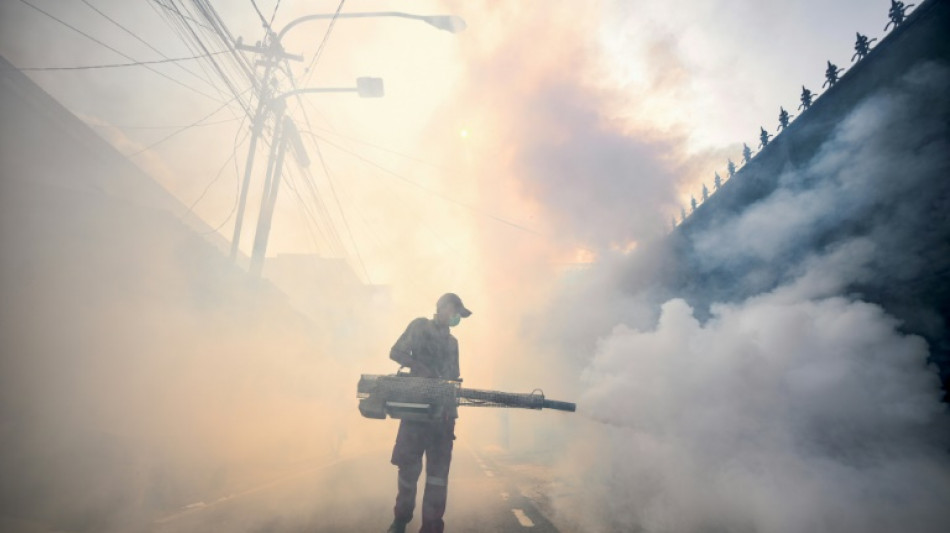
-
 Pandya blitz powers India to T20 series win over South Africa
Pandya blitz powers India to T20 series win over South Africa
-
Misinformation complicated Brown University shooting probe: police

-
 IMF approves $206 mn aid to Sri Lanka after Cyclone Ditwah
IMF approves $206 mn aid to Sri Lanka after Cyclone Ditwah
-
Stocks advance as markets cheer weak inflation

-
 Emery says rising expectations driving red-hot Villa
Emery says rising expectations driving red-hot Villa
-
Three killed in Taipei metro attacks, suspect dead

-
 Seven Colombian soldiers killed in guerrilla attack: army
Seven Colombian soldiers killed in guerrilla attack: army
-
Amorim takes aim at Man Utd youth stars over 'entitlement'

-
 Mercosur meets in Brazil, EU eyes January 12 trade deal
Mercosur meets in Brazil, EU eyes January 12 trade deal
-
US Fed official says no urgency to cut rates, flags distorted data

-
 Rome to charge visitors for access to Trevi Fountain
Rome to charge visitors for access to Trevi Fountain
-
Spurs 'not a quick fix' for under-fire Frank

-
 Poland president accuses Ukraine of not appreciating war support
Poland president accuses Ukraine of not appreciating war support
-
Stocks advance with focus on central banks, tech

-
 Amorim unfazed by 'Free Mainoo' T-shirt ahead of Villa clash
Amorim unfazed by 'Free Mainoo' T-shirt ahead of Villa clash
-
PSG penalty hero Safonov ended Intercontinental win with broken hand

-
 French court rejects Shein suspension
French court rejects Shein suspension
-
'It's so much fun,' says Vonn as she milks her comeback

-
 Moscow intent on pressing on in Ukraine: Putin
Moscow intent on pressing on in Ukraine: Putin
-
UN declares famine over in Gaza, says 'situation remains critical'

-
 Guardiola 'excited' by Man City future, not pondering exit
Guardiola 'excited' by Man City future, not pondering exit
-
Czechs name veteran coach Koubek for World Cup play-offs

-
 PSG penalty hero Safonov out until next year with broken hand
PSG penalty hero Safonov out until next year with broken hand
-
Putin says ball in court of Russia's opponents in Ukraine talks

-
 Czech Zabystran upsets Odermatt to claim Val Gardena super-G
Czech Zabystran upsets Odermatt to claim Val Gardena super-G
-
NGOs fear 'catastrophic impact' of new Israel registration rules
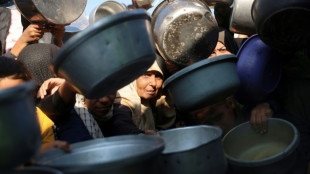
-
 US suspends green card lottery after MIT professor, Brown University killings
US suspends green card lottery after MIT professor, Brown University killings
-
Arsenal in the 'right place' as Arteta marks six years at club

-
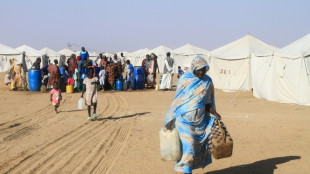 Sudan's El-Fasher under the RSF, destroyed and 'full of bodies'
Sudan's El-Fasher under the RSF, destroyed and 'full of bodies'
-
From farms to court, climate-hit communities take on big polluters
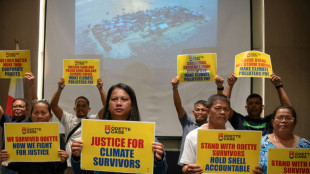
-
 Liverpool have 'moved on' from Salah furore, says upbeat Slot
Liverpool have 'moved on' from Salah furore, says upbeat Slot
-
Norway crown princess likely to undergo lung transplant

-
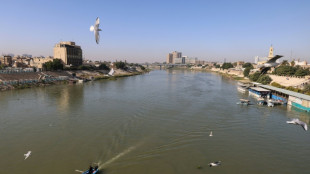 Iraq negotiates new coalition under US pressure
Iraq negotiates new coalition under US pressure
-
France's budget hits snag in setback for embattled PM

-
 Putin hails Ukraine gains, threatens more, in annual press conference
Putin hails Ukraine gains, threatens more, in annual press conference
-
US suspends green card lottery after Brown, MIT professor shootings

-
 Chelsea's Maresca says Man City link '100 percent' speculation
Chelsea's Maresca says Man City link '100 percent' speculation
-
Dominant Head moves into Bradman territory with fourth Adelaide ton

-
 Arsenal battle to stay top of Christmas charts
Arsenal battle to stay top of Christmas charts
-
Mexican low-cost airlines Volaris and Viva agree to merger
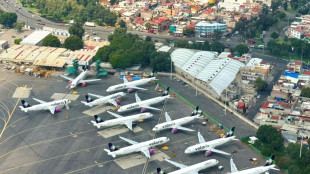
-
 Border casinos caught in Thailand-Cambodia crossfire
Border casinos caught in Thailand-Cambodia crossfire
-
Australia's Head slams unbeaten 142 to crush England's Ashes hopes
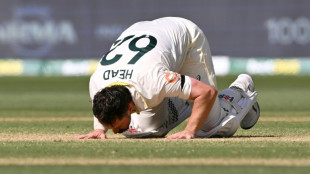
-
 Epstein files due as US confronts long-delayed reckoning
Epstein files due as US confronts long-delayed reckoning
-
'Not our enemy': Rush to rearm sparks backlash in east Germany

-
 West Indies 110-0, trail by 465, after Conway's epic 227 for New Zealand
West Indies 110-0, trail by 465, after Conway's epic 227 for New Zealand
-
Arsonists target Bangladesh newspapers after student leader's death
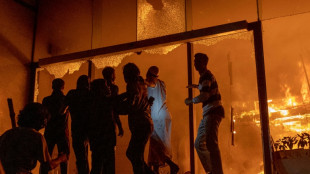
-
 Volatile Oracle shares a proxy for Wall Street's AI jitters
Volatile Oracle shares a proxy for Wall Street's AI jitters
-
Tears at tribute to firefighter killed in Hong Kong blaze

-
 Seahawks edge Rams in overtime thriller to seize NFC lead
Seahawks edge Rams in overtime thriller to seize NFC lead
-
Teenager Flagg leads Mavericks to upset of Pistons


Hotter, drier, sicker? How a changing planet drives disease
Humans have made our planet warmer, more polluted and ever less hospitable to many species, and these changes are driving the spread of infectious disease.
Warmer, wetter climates can expand the range of vector species like mosquitos, while habitat loss can push disease-carrying animals into closer contact with humans.
New research reveals how complex the effects are, with our impact on the climate and planet turbocharging some diseases and changing transmission patterns for others.
Biodiversity loss appears to play an outsize role in increasing infectious disease, according to work published in the journal Nature this week.
It analysed nearly 3,000 datasets from existing studies to see how biodiversity loss, climate change, chemical pollution, habitat loss or change, and species introduction affect infectious disease in humans, animals and plants.
It found biodiversity loss was by far the biggest driver, followed by climate change and the introduction of novel species.
Parasites target species that are more abundant and offer more potential hosts, explained senior author Jason Rohr, a professor of biological sciences at the University of Notre Dame.
And species with large populations are more likely to "be investing in growth, reproduction and dispersal, at the expense of defences against parasites", he told AFP.
But rarer species with more resistance are vulnerable to biodiversity loss, leaving us with "more abundant, parasite-competent hosts".
The warmer weather produced by climate change offers new habitats for disease vectors, as well as longer reproductive seasons.
"If there are more generations of parasites or vectors, then there can be more disease," Rohr said.
- Shifting transmission -
Not all human adaptation of the planet increases infectious disease, however.
Habitat loss or change was associated with a drop in infectious disease, largely because of the sanitary improvements that come with urbanisation, like running water and sewage systems.
Climate change's effects on disease are also not uniform across the globe.
In tropical climates, warmer, wetter weather is driving an explosion in dengue fever.
But drier conditions in Africa may shrink the areas where malaria is transmitted in coming decades.
Research published in the journal Science this week modelled the interaction between climate change, rainfall and hydrological processes like evaporation and how quickly water sinks into the ground.
It predicts a larger decline in areas suitable for disease transmission than forecasts based on rainfall alone, with the decline starting from 2025.
It also finds the malaria season in parts of Africa could be four months shorter than previously estimated.
The findings are not necessarily all good news, cautioned lead author Mark Smith, an associate professor of water research at the University of Leeds.
"The location of areas suitable for malaria will shift," he told AFP, with Ethiopia's highlands among the regions likely to be newly affected.
People in those regions may be more vulnerable because they have not been exposed.
And populations are forecast to grow rapidly in areas where malaria will remain or become transmissible, so the overall incidence of the disease could increase.
- Predicting and preparing -
Smith warned that conditions too harsh for malaria may also be too harsh for us.
"The change in water availability for drinking or agriculture could be very serious indeed."
The links between climate and infectious disease mean climate modelling can help predict outbreaks.
Local temperature and rainfall forecasts are already used to predict dengue upticks, but they offer a short lead-time and can be unreliable.
One alternative might be the Indian Ocean basin-wide index (IOBW), which measures the regional average of sea-surface temperature anomalies in the Indian Ocean.
Research also published in Science this week looked at dengue data from 46 countries over three decades and found a close correlation between the IOBW's fluctuations and outbreaks in the northern and southern hemispheres.
The study was retrospective, so the IOBW's predictive power has not yet been tested.
But monitoring it could help officials better prepare for outbreaks of a disease that is a major public health concern.
Ultimately, however, addressing increasing infectious disease means addressing climate change, said Rohr.
Research suggests "that disease increases in response to climate change will be consistent and widespread, further stressing the need for reductions in greenhouse gas emissions", he said.
D.Cunningha--AMWN


